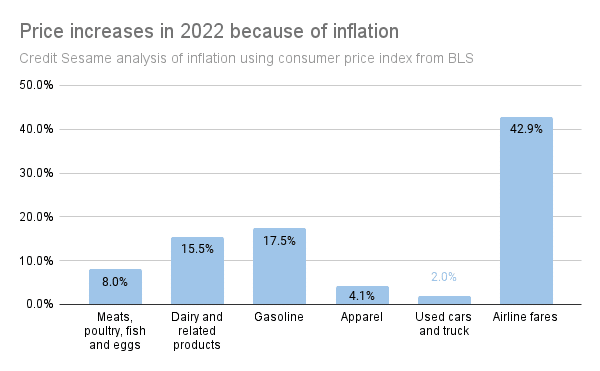Credit Sesame discusses whether student loans affect credit scores.
Pursuing higher education can be immensely rewarding and position you to grow your earning potential for years to come. To get a degree, there’s a good chance of needing to take out at least one student loan. According to the Education Data Initiative, more than 42.8 million Americans have student loan debt adding up to $1.745 trillion.
Most students know it is important to stay on top of their studies, submit assignments on time and prep for tests. Maintaining good credit while completing your degree is also a good idea. After graduation, you may need to rent a home. Landlords can pull your credit report and verify you can make monthly payments. Or you may want to purchase a home rather than rent. Good credit can mean the difference between a great interest rate on a mortgage or an average one. Although employers cannot pull your credit score, businesses can request your credit report. A good credit report indicates that you are responsible with money, a trait employers may like to see.
Student loans affect your credit scores and appear on your credit report like any other debt. Managed right, student loans can be positive for your credit scores.
Student loans add to your credit mix
People with higher credit scores tend to have a mix of credit types. Regular repayments on a variety of credit types, for example, a credit card, a car loan and a student loan, show lenders you’re capable of managing your money. Student loans add diversity that credit reporting companies and prospective lenders like.
Student loans payment history can impact credit scores
The most important thing you can do to maintain your creditworthiness is to make timely payments. Pay your monthly balance in full, rather than falling behind. You can even implement strategies to get out of student loan debt faster by paying extra on your monthly installment.
Some people who have high student loans and other debt might consider bankruptcy. This is something better avoided if possible. Bankruptcies stay on your credit report for years, which can lower your credit score and signal to banks it’s too risky to lend to you.
Student loan deferral can impact credit score indirectly
A student loan deferral does not impact credit scores directly because it is done with permission from the lender. Many people defer student loan payments while in school or even after graduation for various reasons. Typically, a student loan deferral allows you to postpone making payments on the principal, interest or both for a period of time. However, a deferral may increase the size and age of unpaid debt, which can harm credit scores. Also, waiting to defer until the loan is delinquent may also hurt credit score.
Cosigned student loans have pros and cons
Many students don’t have sufficient credit to take out a big loan for school. In those cases, some cosign a loan with a parent or other trusted adult. This can have pluses and minuses for your credit.
On the plus side, cosigning can give you eligibility for a student loan that diversifies your debt types. Your name goes on the account, along with the cosigner. This can positively affect your credit score by adding a new debt type. When you make payments, you can demonstrate your ability to manage money, further strengthening your credit. Associating your name with a parent whose credit is better than yours also gives lenders added confidence the debt will be paid.
On the minus side, cosigning comes with risks. If you cannot make payments on a cosigned loan, and your cosigner is in the same situation, you could quickly fall behind. This could hurt your credit and lower your score – and that of your cosigner. Cosigning brings an added level of responsibility for both parties to make good on their commitment to the lender.
What else should I know about student loans and credit?
Student loans bring a legal responsibility to repay the debt. Before taking out a loan, plan for how the funds will be used, know the interest-rate terms and understand the repayment timeframe. If it does not make sense for your financial situation, do not do it. There may be other ways to pay for your education, such as taking on a side hustle to earn extra money or taking a few classes each semester and cash-flowing your schooling.
If you decide to get a student loan, you might like to download the free Credit Sesame app to see how your credit report and credit score are doing as you go through school. Continue practicing good financial management with your credit cards and other debt so you are in good shape to cover education expenses when payments begin. Keep track of monthly statements and pay on time, every time
If you found Do student loans affect credit scores? useful, you may be interested in:
- Best Ways To Pay Student Loan Debt
- Fighting & Winning the Student Loan Debt Battle: How My Wife and I Paid Off $100,000
- Student Loan Forgiveness Blocked: What Now?
Disclaimer: The article and information provided here is for informational purposes only and is not intended as a substitute for professional advice.





















